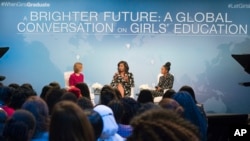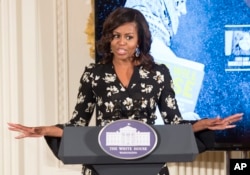Twenty-two Liberian girls are in Washington, D.C., as part of the U.S. government’s "Let Girls Learn" initiative. Their trip is a follow-up to first lady Michelle Obama’s visit to Liberia and Morocco in June to highlight girls' education and U.S. support.
During their week-long stay in Washington, the girls visited the newly opened National Museum of African American History. The girls also attended workshops and visited the White House to watch the screening of a CNN documentary about girls' education: "We Will Rise: Michelle Obama’s Mission to Educate Girls Around the World."
During a luncheon at the Liberian Embassy in Washington, the girls talked about some of the challenges they face in trying to receive an education.
“Some of the challenges girls face are parental care, because of our friends lost their parents during the Ebola crisis. Some want to go to school, but due to low finance they are unable to go to school,” said Shalita Jill of the Frank Emmanuel Tolbert senior high school in Monrovia.
Scourge of FGM
The girls also said some of their friends' education has been affected by the Sande women’s secret society, where it is alleged female genital mutilation takes place.
“The Sande business is really high in Liberia, especially where I live – Bensonville – you will notice that the people will take the girl children from school and carry them to the Sande bush, and the girls lose their education for that year,” Jill said.
Every year thousands of girls leave their homes to attend the forest camps aimed at preparing them for marriage. They learn everything from social etiquette, good morals, domestic skills and correct sexual comportment to how to look after their future home and husband.
It is alleged that during this rite of passage that girls are subjected to Female Genital Mutilation (FGM) in which the clitoris and labia are cut. The procedure is said to prevent promiscuity and improve fertility, but it can prove fatal.
Activists around the world have campaigned against the practice.
The girls said they were grateful to the U.S. Embassy in Monrovia for making their trip to Washington possible.
Vocational training
One girl, Harriette, appealed to the U.S. to help construct vocational schools for girls who might not have the opportunity to go further in their education.
“[T]hey go to grade school and then they feel shame," she said. "But if the U.S. Embassy helps us with some trade schools, like soap-making, hairdressing, I think it will be better for us."
Alice N. Mulbah said Michelle Obama encouraged them not to give up on their education in the face of the many challenges they face.
According to the U.S. Embassy in Liberia, the 22 girls were selected due to their participation in educational programs supported by the Peace Corps, U.S. Agency for International Development (USAID) and the State Department.
"Investing in adolescent girls through education benefits not only girls and their families, but entire communities and economies," the embassy said. "When girls remain in school, they are more likely to marry later, have fewer and healthier children, and earn an income that they will invest back into their families and communities."





